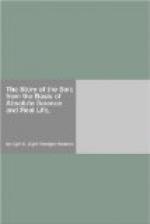THE SLAVE AND THE FREEDMAN
The others had retired but Percy and his host continued their conversation far into the night.
“There are almost as great variations among the negroes as among white people,” Mr. West was saying. “To a man like Wilkes who was born and raised here on the farm, I would entrust the protection of my wife and children as readily as to any white man. He has been educated, so to speak, to a sense of duty and honor; and negroes of his class have almost never been known to violate a trust. Of course there are bad niggers, but as a rule such negroes have grown up under conditions that would develop the evil in any race of men.
“During the Secession it was the most common thing for the men to go to war and leave their defenseless women and children wholly in the care of their slaves; and, even though the federal soldiers were fighting to free the slaves and their masters to keep them in slavery, rarely did a negro fail to remain faithful to his trust. They hid from the northern soldiers the horses and mules, cotton and corn, clothing and provisions, and all sorts of valuables; and in most cases were ready to suffer themselves before they would reveal the hidden property. To be sure there were masters who abused their slaves, and some of these were naturally ready to desert at the first opportunity; but in the main the slave owner was more kind to his human property than the considerate soldier was to his horse, and the negro as a race is appreciative of kindness.”
“I suppose the depreciation in soil fertility and crop yields dates largely from the freeing of the slaves does it not?” asked Percy.
“Well, that was one factor, but not the most potential factor. Much land in the south had been abandoned agriculturally long before the war, and much land in New York and New England has been abandoned since the war. The freeing of the negroes produced much less effect in the economic conditions of the south than many have supposed. The great injury to the South from the war was due to the war itself and not to the freeing of slaves. In the main it cost no more to hire the negro after the war than it cost to feed and clothe him before; and the humane slave owner had little difficulty in getting plenty of negro help after the war. Very commonly his own slaves remained with him and were treated as servants, not particularly differently than they had been treated as slaves. Of course there were some brutal slave holders, just as there are brutal horse owners, and such men suffered very much from the loss of slave labor.
“The southern people have no regrets for the freeing of the slaves. Probably it was the best thing that ever happened to us; and the South would have less regret for the war itself, except that our recovery from it was greatly delayed by the reconstruction policy which was followed after the war. The immediate enfranchisement of the negro, especially in those sections where this resulted in placing all the power of the local government in the hands of the negro, was a worse blow to the South than the war itself.




